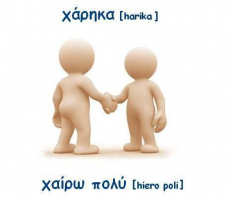
Now we’ve got the hang of the alphabet, letter combinations and accents, it’s time to put that knowledge into practice. Greek, like Italian, is actually very easy to pronounce once you know what the letters are, as everything is written phonetically. This means that you say it as it’s written, there aren’t any silent letters, and the way the letters are said doesn’t change depending on the word. Unlike English – most of our words aren’t said how they’re written, for example the word “knee” – where on earth did the silent letter ‘K’ come from?
So, if you wanted to say hello to somebody in Greek, you can greet them in various ways, depending on their relationship to you. If you were greeting a teacher, or a stranger, you’d say “γεια σας” (yia sas) because this is the formal greeting. It’s also the plural, so if you were talking to a lot of people this is what you would use. If you wanted to say hello to a friend, you would say “γεια σου” (yia sou).
You can also vary your greeting depending on the time of day. If you wanted to wish somebody a good morning, you would say “καλιμέρα”, pronounced “kali-meh-ra”. There’s not really an equivalent for “good afternoon”, so just use “γεια σας/σου”. To say “good evening”, it’s “καλισπέρα” (kali-spe-rah). If you were going to bed, and wanted to say “goodnight”, you would say “καλινύχτα” (kali-nick-ta). To say goodbye, it’s “αντίο”, pronounced “adio” – a bit like “adios” in Spanish.
As you can see from the picture, if you shake hands with somebody, you say “χάρηκα”, which is basically their way of saying “pleased to meet you”. It’s pronounced like this: “har-ika” The other phrase is “χαίρω πολί” (pronounced “hair-o pol-i”) which is a jolly and friendly way of saying “greetings”! Doesn’t sound like something you’d use much in English, but in Greek, you do!
If you are going to introduce yourself, you say “με λένε…” (meh leh-nay), meaning “my name is”. To ask someone theirs, it’s “πώς σε λένε;” (pos se leh-nay). Technically this means “what are you called”, but it’s what the Greeks use. You’ll notice that at the end of this Greek sentence, there is a semi-colon. This is because this is what the Greeks use as a question mark! So, if you ever see a semi-colon in Greek, remember that it’s a question mark and not a bit of advanced punctuation in the wrong place!
If somebody asks you where you’re from, they would say “από πόυ είστε/είσαι;” (depending on whether they’re being formal or informal). This pronounced “apo pou e-stay/e-say”. As we saw before, “πόυ” means “where”. “Είστε/είσαι” refers to “you”, and “από” is “from”, in this sentence. To reply, you would say “Είμαι από την…” (e-may apo tin) followed by the name of your country, in Greek. If you’re English, you’d say “Αγγλία” (ang-lee-ah). For Scottish people, it’s “Σκωτία” (scot-ee-ah). If you’re Welsh, you’ll say “Ουαλία” (wall-e-ah). If you’re from Northern Ireland, it’s a bit more complicated, because you’ll say “Βόρεια Ιρλανδία” (vo-ray-ah eer-lan-thee-ah) as opposed to just “Ιρλανδία” (eer-lan-thee-ah) for the Republic of Ireland.
You can be extra polite and ask somebody how they are, if you feel comfortable. The most common way of doing this is by asking “τι κάνεις;” (tee kah-nis). Technically, this means “what do you do?”, and you can use it to ask what somebody does for a living. However, in Greece it’s also used to ask how somebody is. If you’ll find that hard to remember, or get confused, you can always use “πός είστε/είσαι;”, again depending how formally you want to greet somebody.
One thing you’ll be asking a lot is, of course, “do you speak English?”. You might think this rather defeats the point of learning Greek, but in Greece, people are delighted even if you try just a little bit of Greek. To ask this, it’s “μιλάτε Αγγλικά;” (me-la-teh an-gli-ka), and if they start speaking in English then that’s how you will know.
Next time, we’ll move on to shop conversations, but in the meantime keep on practicing your Greek!
Image from: https://www.pinterest.com/pin/568509152934629452/

0 Comment:
Be the first one to comment on this article.